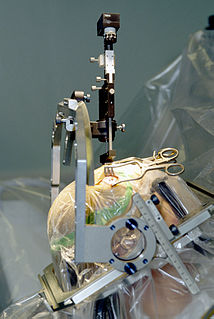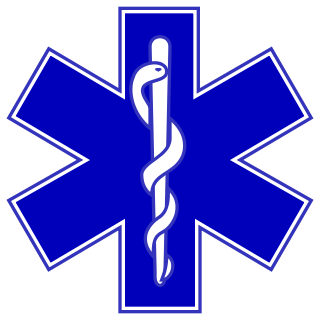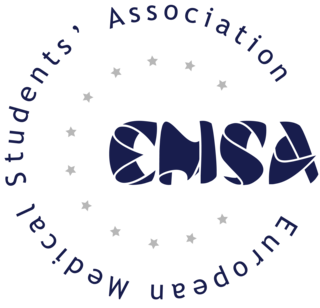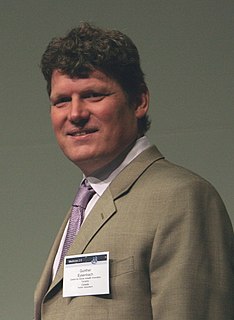EMSA may stand for:

Neurosurgery or neurological surgery, known in common parlance as brain surgery, is the medical specialty concerned with the prevention, diagnosis, surgical treatment, and rehabilitation of disorders which affect any portion of the nervous system including the brain, spinal cord, central and peripheral nervous system, and cerebrovascular system.

In Greek mythology, the Rod of Asclepius, also known as the Staff of Aesculapius and as the asklepian, is a serpent-entwined rod wielded by the Greek god Asclepius, a deity associated with healing and medicine. Theories have been proposed about the Greek origin of the symbol and its implications. In modern times, it is the predominant symbol for medicine and health care although, because of a misunderstanding, the Caduceus is sometimes seen in this context.
Ems or EMS may refer to:

Intensive care medicine, also called critical care medicine, is a medical specialty that deals with seriously or critically ill patients who have, are at risk of, or are recovering from conditions that may be life-threatening. It includes providing life support, invasive monitoring techniques, resuscitation, and end-of-life care. Doctors in this specialty are often called intensive care physicians, critical care physicians or intensivists.
A student society, student association, university society or student organization is a society or an organization, operated by students at a university or a college institution, whose membership typically consists only of students or alumni.
AMS or Ams may refer to:
MSA or M.S.A. may refer to:
Ema or EMA may refer to:
A medical specialty is a branch of medical practice that is focused on a defined group of patients, diseases, skills, or philosophy. Examples include children (paediatrics), cancer (oncology), laboratory medicine (pathology), or primary care. After completing medical school, physicians or surgeons usually further their medical education in a specific specialty of medicine by completing a multiple-year residency to become a specialist.

The European Medical Students' Association (EMSA) is a non-governmental and non-profit organisation for medical students; it offers opportunities to their members and provides a voice for medical students across Europe, representing their interests to other European institutions and organizations. EMSA was founded in Brussels in 1990. It integrates medical students in Europe through activities organized for and by medical students. EMSA's network and platform encourages medical students from various countries in geographical Europe to actively engage in matters related to health care, medical education, medical ethics, medical science, and general societal well-being, by acting as a conduit for increased interaction and sharing of knowledge between European medical students in these respective areas.

The California Emergency Medical Services Authority is an agency of California State government. The California EMS Authority is one of the thirteen departments within the California Health and Human Services Agency. The director is required to be a physician with substantial experience in emergency medicine. Dave Duncan MD is the current Director.

Marion County’s Emergency Medical Services Alliance, Inc. (EMSA) was a non-profit governmental Emergency Medical Services (EMS) agency created by a partnership between The Marion County, Florida Board of County Commissioners, The City of Ocala, Ocala Regional Medical Center/West Marion Community Hospital and Munroe Regional Medical Center. EMSA was responsible for providing leadership, field supervision and medical direction for 911 based emergency medical services responses, patient contacts, and ambulance transportation within the 1,653-square-mile (4,280 km2) service area in North Central Florida from 2003 to 2008.
Keith Roberts Porter was a Canadian-American cell biologist. He performed pioneering biology research using electron microscopy of cells, such as work on the 9 + 2 microtubule structure in the axoneme of cilia. Porter also contributed to the development of other experimental methods for cell culture and nuclear transplantation. He also was responsible for naming the endoplasmic reticulum.

Richard Henderson is a Scottish molecular biologist and biophysicist and pioneer in the field of electron microscopy of biological molecules. Henderson shared the Nobel Prize in Chemistry in 2017 with Jacques Dubochet and Joachim Frank.

Gunther Eysenbach is a German-Canadian researcher on healthcare, especially health policy, eHealth, and consumer health informatics.
Divers Alert Network (DAN) is a group of not-for-profit organizations dedicated to improving diving safety for all divers. It was founded in Durham, North Carolina, United States, in 1980 at Duke University providing 24/7 telephonic hot-line diving medical assistance. Since then the organization has expanded globally and now has independent regional organizations in North America, Europe, Japan, Asia-Pacific and Southern Africa.
The Emergency Medical Services Authority (EMSA) is Oklahoma's largest provider of pre-hospital emergency medical care. EMSA provides ambulance service to more than 1.6 million residents in central and northeast Oklahoma.
The following outline is provided as an overview of and topical guide to biophysics:
Elmar Zeitler was a German physicist.

Malta has a long history of providing publicly funded health care. The first hospital recorded in the country was already functioning by 1372. Today, Malta has both a public healthcare system, known as the government healthcare service, where healthcare is free at the point of delivery, and a private healthcare system. Malta has a strong general practitioner-delivered primary care base and the public hospitals provide secondary and tertiary care. The Maltese Ministry of Health advises foreign residents to take out private medical insurance.